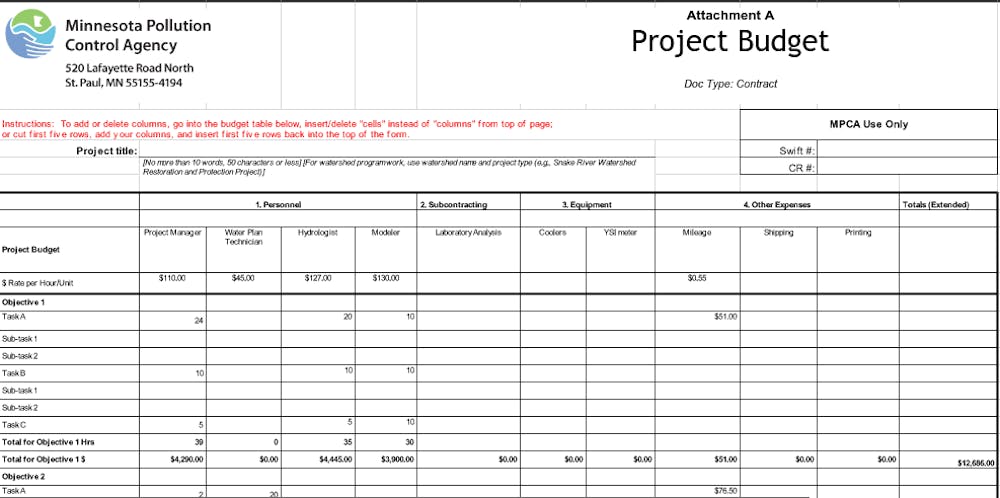Creating a budget can be overwhelming, and only 40 percent of American families have a working monthly plan for their spending.
Developing a long-term budget has been linked to building wealth, while simultaneously helping you get out of debt and cut expenses.
If you’re a first-time budgeter, here are some steps to make the process as painless as possible.
Know How Much You Have
If you have savings, checking or investment accounts, you'll want to know how much money is in each account, as well as the interest rates and expenses of each one.
Make a note of this information, as it will become important in determining your net worth.
Know How Much You Make
Those on a salaried pay scale can easily find their monthly income, but hourly employees or those who work in a business where income may rise and fall unpredictably may have a little more calculating to do.
The most important consideration is to determine the average monthly amount of income that you receive. If you receive irregular income, average out the last six to 12 months of recurring income and use that figure.
- If you work hourly, multiply your hourly wage by the number of hours you work per week.
- If your schedule varies, use the minimum number of hours you work per week instead of the maximum. Multiply your approximate weekly wage by four to come up with an approximate monthly wage.
- If you get paid a salary, divide your yearly salary by 12 to determine approximately how much money you make per month.
- If you get paid bi-weekly, base the monthly budget off of two paychecks. This is especially helpful if your budget is tight, then twice a year you'll get bonus paychecks to put towards savings.
- If you have an irregular income, average out the last six to 12 months of recurring income. Use the average to build a monthly budget, or choose the lowest monthly amount to provide yourself with a worst case scenario.
Make sure to skip bonuses, overtime and non-recurring income.
If you can't rely on receiving sources of money during any given month, don't factor it into your monthly budget. If you do receive extra funds throughout the month, go back to your budget and determine if you should save, spend or invest the money.
Determine Your Average Recurring Monthly Expenses
This can be the hard part for many people.
Determining your monthly recurring debt payments should be your next step. Keep your receipts, your utility bills and any other expenses that arise during a one month period, and divide these bills into categories.
To find out what your monthly recurring debt payments are, calculate the total amount owed on each debt account as well as the minimum monthly payment. This includes car loans, mortgages, credit card debt, student loans and all other debt your family pays on a monthly basis.
This will provide you with the first few line items in your budget, and will allow you to determine your net worth.
For example, your monthly debt payoff might include the following: a $300 car payment, a $700 mortgage and $200 in credit card payments. That's a total of $1,200 in monthly expenses.
Look at Your Past Cash Withdrawals
Dig into ATM receipts and bank statements to determine how much you typically withdraw each month. Of this, determine how much was spent on necessity versus want. If you kept all your receipts from the past month, look through them and calculate how much you spent on things you needed: gasoline, food and so on. Subtract this amount from your total monthly cash withdrawal to determine how much you spent on things you merely wanted: a new video game or a name brand bag, for example.
Adjust Your Budget Based on Reality
Life is full of surprises. Food, gas and rent can increase when you least expect it. Each time you notice inflation within your expense categories, get a raise at work or suffer a financial setback like a pay cut or job loss, you will have to adjust your categorical expenses based on the realities of the world around you.
Organize Your Budget
Separate your budget into two basic sections: income and expenses. Fill in each section with the information as you calculated it, marking down a separate entry for each individual source of income as well as each expense.
- Calculate two totals for the income section. For the first, add all the new income you bring in each month, and for the second add everything together, including the money you have saved in accounts.
- Calculate three totals for the expenses section. Add together your fixed expenses, including debt payments, and then add together payments that vary from month to month. For the third, calculate your total expenses.
Then, subtract your total expenses from your new income. In order to save money, you must have a positive difference, and in order to break even, the two totals must balance each other out.
Never allow your total expenses to exceed your total income. Your total income includes your savings, so if you exceed it, you will go into debt.
Track, Monitor and Be Disciplined about Your Budget
Keeping track of your budget takes about an hour per week. But this will save you a lot of time in the long run.
Once you have an established budget, you will want to keep it in check. You can use a pencil and paper or standard spreadsheet software to make it easier to calculate and alter as necessary, but you may also find it convenient to write your budget out and keep it by your checkbook or credit card to serve as a constant reminder.
Software should tally everything up immediately and give you an idea of how much of a dent that increase would put in your discretionary spending. Bank of America offers a spreadsheet template you can download for free.
This information is gathered from Investopedia, American financial author Dave Ramsey and Ball State Family and Consumer Sciences instructor Pamela Stigall.





